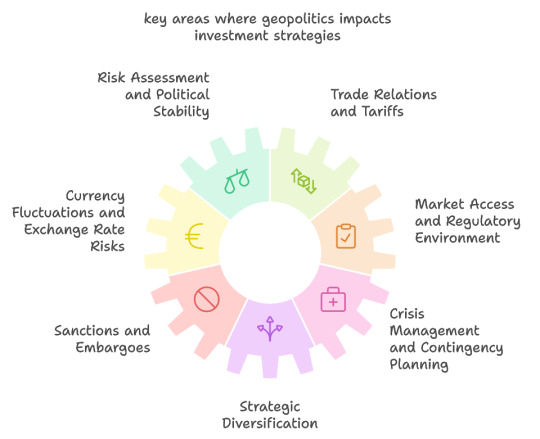#InternationalFinanceTutors
Explore tagged Tumblr posts
Text
How Geopolitics Impact Investment Strategies in International Finance
In today’s contemporary globalized environment, international finance is to a very large extent influenced by geopolitics. Encompassing everything from trade wars, and diplomatic relations to national policies, and conflicts. They change constantly, affecting world financial markets to a very large extent. These factors are important for students pursuing international finance because they help them analyze the various international investment risks involved and available opportunities in the global context. For example, recent data shows that political factors have a significant impact on world stock markets. For instance, in the 2016 U.S. presidential election, the subsequent shift to Donald Trump’s administration boosted the S&P 500 by 11% in the first year reflecting the concrete impact of politics on share market investment. Also, the COVID-19 crisis deepened geopolitical tension, and FDI dropped by 42% in 2020 because of an increase in uncertainties and economic disruptions.
For students who choose the area of global finance as their research topic, these geopolitical factors provide valuable insights into complex international relations and financial implications. At times, students may struggle with the amount of analysis that they are expected to deliver, and, in such scenarios, choosing international finance assignment help is beneficial. Such assistance can help students discover new perspectives, grasp the technicalities of the topic, and assist in relating the theories learned in class to real-life scenarios.

Decoding of the Effects of Geo-Political Risk on Investment Management
As investment strategies in international finance are directly affected by the geopolitical environment, geopolitical factors play an important role in financial decision-making. These strategies have to be very flexible and adaptable to change because of the volatile nature of geopolitics directly affecting asset prices, currency fluctuations, trade regulations, and even market sentiments. Let's discuss some key areas where geopolitics impacts investment strategies:
1. Risk Assessment and Political Stability
Potential investors look at the political stability of a country before making any investment. A stable political system means that investors are assured of high returns on their investments, whereas an unstable political position creates a highly uncertain environment. For example in Venezuela, the deteriorating economy that the country faced in the recent past due to political instability and external forces led to extremely high inflation rates and a mass exodus of businesses and investors. Venezuela witnessed political volatility, which significantly decreased FDI, and greatly affected the global companies investing there.
As for students, understanding political risks and their impact by analyzing such cases helps build a detailed understanding of how these risks may result in financial benefits or losses. Global agencies such as Moody’s, Fitch, and Standard & Poor’s often change the credit rating of countries due to political risks which invariably influence the cost of borrowing and investment inflows. For instance, when the United Kingdom decided to leave the European Union (Brexit), credit rating companies lowered the United Kingdom’s rating which caused borrowing costs to rise and the pound’s value to drop.
2. Trade Relations and Tariffs
International trade policy and tariffs have a major impact on global financial markets and investment strategies. The current trade conflict between the United States and China is an excellent example of the impact that politics might have on investments. Since 2018, the US levied tariffs of billions of dollars on Chinese goods, and China responded with the same on American products. This led to increased volatility in the stock markets and companies operating in both countries faced reduced profitability and increased insecurity.
The students of international finance can further go deep into this example to understand how trade policies have an immediate impact on corporate revenues and how strategic investors may transfer their earnings to the markets that are less uncertain. Furthermore, students can be able to assess the outcomes of ongoing trade conflicts to predict possible currency fluctuations and learn how firms might transition to “near-shoring,” which means shifting production closer to home to avoid supply chain interruptions.
3. Currency Fluctuations and Exchange Rate Risks
Currency fluctuations are often stimulated by geopolitical tensions, which affect international investments. This is true because once the political relations between two countries are not favorable then their balance of trade will define the circulation of each country’s currency in the trade. For example, due to economic sanctions by Western countries in the year 2014, after the annexation of Crimea; the Russian ruble declined sharply. The ruble’s decline forced investors with significant Russian holdings to reconsider their investment strategies or hedge against currency risk.
For students, understanding currency fluctuations due to geopolitical tensions is crucial. Many of these risks can be managed through using currency futures or options. Books from authors such as Jeff Madura in “International Financial Management” provide students with a deeper understanding of currency markets, exchange rate forecasting, and hedging strategies — critical skills for any international finance student..
4. Market Access and Regulatory Environment
Regulatory policies may be influenced by geopolitical dynamics, which can restrict or facilitate foreign investments. For example, the Chinese government raised restrictions on outbound investment--curbing capital outflow--in 2017, thus inhibiting Chinese companies from investing abroad. This has affected global real estate and hospitality, where Chinese investment has been very important.
These types of regulations show how governments use instruments of economic policy to control the flow of these investments. Students who are specializing in international finance should read such regulations to gain knowledge on how they can shift the dynamics for MNCs. Academic resources such as "The International Political Economy of Investments" by Eric Helleiner would be useful in understanding how government regulations affect the flow of international investments.
5. Sanctions and Embargoes
The most popular and direct tools through which political interactions within the geopolitical context affect international finance are sanctions and embargoes. For example, the restrictions on Iran’s access to the world’s financial systems made by the US and several European countries have brought about serious financial consequences. Due to these sanctions, Iran was shut off from the internal financial systems impacting companies all around the region. Local European firms that invested in Iranian markets had to either pull their operations or face penalties imposed by the United States.
This example also helps the students to apprehend the idea that political actions can definitely interfere with the stability of markets internationally, as well as ruin the profits of multinational organizations. Understanding sanctions, their effects on economies, and compliance risks is valuable information for students interested in financial professions. One useful textbook “Global Political Economy” by John Ravenhill provides a section devoted to the role of sanctions in the context of international finance.
6. Crisis Management and Contingency Planning
Investors need to respond swiftly to rapidly changing events such as wars, economic downturns, etc. As such conflicts have great influences on the investment strategy. Recently, the Russia-Ukraine War has largely affected worldwide energy prices, food security, and performance in world markets. Along with other big businesses, the oil-and-the-gas price surge affected companies in various sectors - transportation, and manufacturing - across the globe.
This situation shows how geopolitical crises entail investors responding with contingency plans and portfolio diversification, as well as high levels of risk exposure management. By learning about contingency planning and thereby dealing with crisis management case studies, students acquire insightful knowledge on maneuvering the complex international financial environment. Resources like the Handbook for International Crisis Management offer more perspectives into what companies should do at times of financial and geopolitical crises.
7. Strategic Diversification
In this case, the investors tend to adopt strategic diversification as a way of managing the risks that are caused by geopolitical tensions. Political stability in some parts of the world creates a favorable climate for international investments while instability in other parts of the leads to capital outflows. For instance, during the Greece debt crisis, investors pulled out money and invested in other stable European countries while Greece’s economy struggled due to capital flight.
For students, diversification is another robust strategy taught in international finance to mitigate country-specific risks. Through examining portfolio management, the students will be able to examine the risks and returns on the different markets. Books such as Bruno Solnik’s “International Investments” where more attention is given to diversification and other strategies for managing international portfolios.

How our Expert Guidance helps you grasp the Geopolitical Impacts on Investments
Availing of our international finance assignment help service provides finance students with valuable assistance to grasp complex topics in global finance and assistance in solving difficult case studies and assignments. International finance is a complex subject involving different dimensions and to understand how political changes affect the global financial systems, one must understand underlying theories, political dynamics, and risk assessment techniques. Our tutors provide students with different perspectives, drawing from current trends and historical data, which is immensely helpful in coursework assignments and research papers.
Our tutors familiarize the students with the current developments in geopolitics, trade policies, and exchange rates giving them a new perspective on how these aspects affect international finance. Through case discussions involving current events including the trade dispute between the US and China, Brexit, and the Russo-Ukrainian War and Crisis we guide the students to learn how these events impact investment decisions.
Besides geopolitics, we also help in other major aspects of international business and finance such as exchange risk, international diversification, regulatory issues on internationalization of investments, and crisis management. Our experts assist the students in explaining hedging currency risk, financial derivatives, and credit risk assessment so that they master practical skills for the global finance industry. Recognizing such issues, students acquire a practical understanding of how theory can be implemented and develop confidence in solving complex tasks and case tasks.
Our service also helps students to be innovative in terms of critical thinking and developing new perspectives to be able to stand out in their finance courses. Whether it is about structuring a thesis, analyzing a specific geopolitical case, or mastering investment strategies, our international finance assignment help experts are always helpful for struggling students.
Conclusion
Understanding political risks affecting investment decisions is important in today’s developing global economy. For the students, learning these dynamics provides them with foundational knowledge on how to manage global investments. It is important to know that globalization increases the integration of countries meaning geopolitical events will always impact international finance. Any student in need of assistance may benefit from engaging in these topics with the Help with International Finance Assignments expert because we offer a practical understanding of the subject that will help them map the theories to real scenarios.
#InternationalFinanceAssignmentHelp#HelpWithInternationalFinance#InternationalFinancialManagement#InternationalFinanceHomework#GlobalFinanceHelp#InternationalFinanceTutors#FinanceAssignmentHelp#FinanceHelpOnline#GlobalFinanceTutoring#InternationalFinanceSupport
0 notes